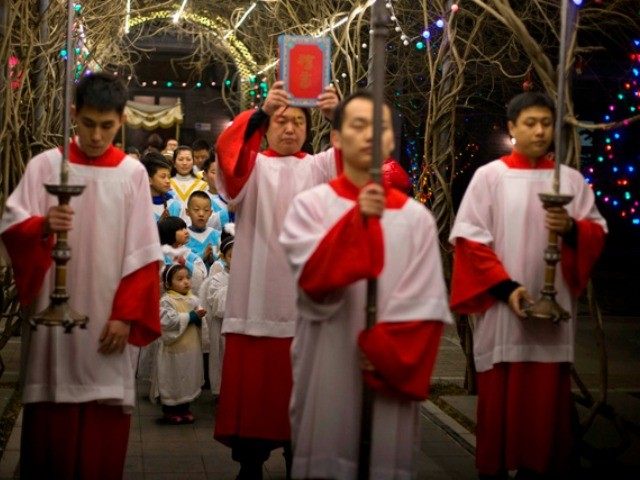The relationship between the Catholic Church and China is “an open wound, which must be treated and cured,” says Joseph Wei Jingyi, the underground bishop of Qiqihar, in northeast China.
In a recent interview, Bishop Wei stressed the urgent need to “overcome this rift between the Church and China,” because “it also ends up causing a division among ‘official’ Catholics and ‘underground’ Catholics within China.”
Wei said that “divisions have crystallized in the course of history,” but proposed that “if the problem of relations with the government could be solved, the divisions among Catholics would also be remedied over time.”
“So the problem of relations between the Church and the government must be addressed as soon as possible,” he said.
The 57-year-old Wei, a native of the diocese of Baoding, has been imprisoned three times, once for more than two years, and has had his personal freedoms restricted. Wei’s episcopal ordination is not recognized by the government because of Beijing’s animosity toward Rome. He was invited to attend the Synod of Bishops at the Vatican in 2005, but the government barred him from attending.
Since 1958 China’s Catholic Church has been split into underground and open communities, with the latter going by the title of the Patriotic Catholic Association. A Vatican document of 1988 barred Roman Catholics from participating in the sacraments of the Patriotic Church, noting that the patriotic association had issued a proclamation saying the church “had broken all relationships with the pope” and would be “under the direct control of the government.”
In 1988, Pope Benedict XVI reached out to Catholics in China with an open letter, in which he praised their faithfulness, encouraged their perseverance, and laid out new guidelines for the life of the Church in China.
Bishop Wei said that Benedict’s letter “represents a very important line of demarcation” and that it “clearly describes how Chinese Catholics face and live the present time, with its problems.”
Though he acknowledges the risks, Wei is a firm believer in the need for dialogue to get the ball rolling. “Precisely because there are problems,” he said, “we need to find solutions through dialogue and in dealing with the government, also by establishing diplomatic channels of dialogue. That is the way to try to loosen the knots that cause division,” he said.
“I believe that any theory of holding out to the bitter end or ‘cold war’ contradicts the heart of Christianity,” Wei said.
“Everyone must do his part to achieve harmony, reconciliation and peace,” he said. “This is the path indicated by the Gospel.”
Wei praised the Vatican’s recent overtures toward Beijing. “We support all these initiatives that the Pope is taking to communicate his willingness to talk,” he said. The Vatican has indicated it may be willing to break off relations with Taiwan, which is a condition laid out by mainland China for the renewal of diplomatic relations.
“A Christian always tries to take the first step to reconcile and heal the wounds of men and society,” he said. “So it is right for the Church to take the first step.”
Wei said that even within the underground Catholic community “the vast majority would approve the initiative to deal with the government to solve the problems of the Church. That is the way to make life easier for the faithful,” he said. “A minority perhaps would grumble at the beginning, saying that the Pope does not understand and so the Church loses face. But then, over time, they would understand and would follow the path taken by all.”
Wei is a fan of Pope Francis and spoke of his popularity in China.
“We follow everything,” he said, “his homilies at Mass at Saint Martha’s every morning, his speeches, Wednesday catecheses, meetings and trips. Through the internet, we are updated on everything he does and says. It all reaches us. Maybe the next day, but it gets there.”
“Pope Francis,” said the bishop, “is a gift of God for the Church today, and also for all of humanity. And the things he suggests are very relevant for the present situation of the Church and society of China.”
Wei said that ultimately, unity in the Church is a spiritual endeavor, and not merely a human one.
“Everybody uses a cell phone these days,” he said. “It is a useful tool. But if the battery is discharged and there is no current to charge it, it doesn’t work and is useless. It’s like that in the Church as well. We can make efforts to bring about unity. But if there is no unity in the love of God, lived in prayer, nothing works. And all our attempts to build unity among us won’t go anywhere.”
Follow Thomas D. Williams on Twitter @tdwilliamsrome

COMMENTS
Please let us know if you're having issues with commenting.